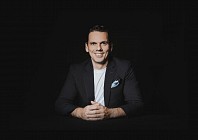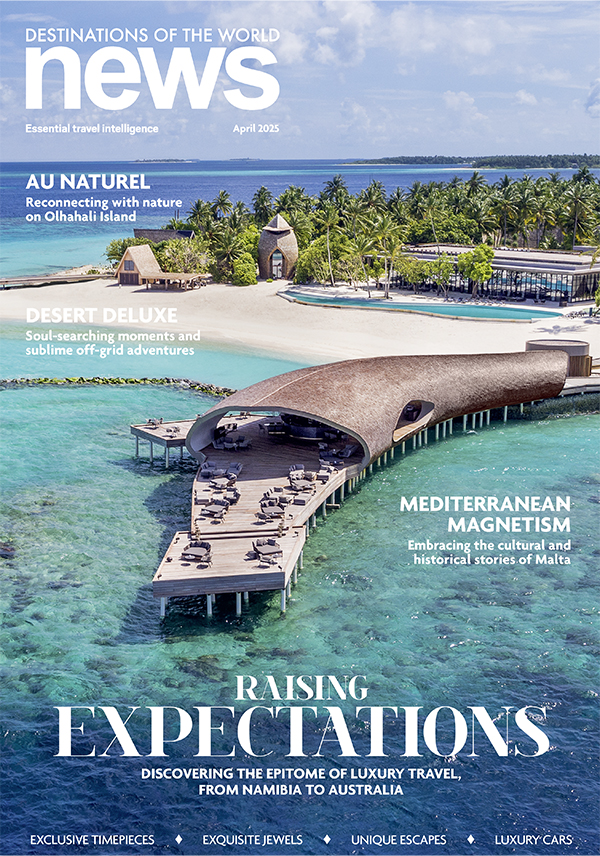Professional polo player Nacho Figueras is a well-known face on and off the pitch; he’s often seen hobnobbing with the likes of Prince Harry and other celebrities at charity polo events around the world, and you may also recognise him as the face of Polo Ralph Lauren fragrances, a position he’s held for more than a decade.
One thing’s for certain, he sure has an effect on the female journalists who have turned up at a press briefing at the St. Regis Saadiyat Island Resort in Abu Dhabi to interview him – I haven’t seen so many flushed cheeks and sideways glances since my first school dance.
But the man with the beautiful face turns out to be refreshingly down to earth. Having donated his time to several charitable causes, he’s now on a mission to spread the Sport of Kings to new audiences around the world, hoping to re-brand it as a sociable, adrenaline-pumping pastime worth travelling for, along the lines of the Formula 1, golf and tennis. Here, he reflects on what it takes to reach a global audience, and why newly affluent countries like China and the UAE are embracing polo with open arms.
You’re on a mission to globalise polo and bring it to new audiences around the world. How do you plan to make it more accessible?
There are two sides to it: one is to make it more approachable to spectators and to encourage more people to attend polo matches, in order to kind of demystify the sport. The other is to encourage more people to play polo, because it is a lot of fun. It is a great sport, and the connection with the horses is fantastic. For those who dream of playing polo but don’t have the means to do so, I want to show that if you really have the passion, you can go to a local polo club and start getting involved. I want to show the kids that if they are really passionate about it, nothing can stop them from becoming the best polo player in the world.
Historically polo was reserved for royalty, and it’s still seen as an elitist sport, would you agree?
I think there’s a side of polo that’s associated with royalty, but there’s also a side that’s associated with people who love horses, which is the side of polo that I really want to focus on. A lot of sports with an international following, like football, are ones that people play as well as watch.
Is polo at a disadvantage in that way?
For every sport you have to start young to play professionally. But if you don’t have the chance to start young, you can still have a lot of fun doing it. A lot of people travel to play golf or tennis and it’s just for fun. Polo is actually great for that, too. Logistically it’s a little bit more complicated than football or tennis or golf – it’s not just a matter of buying the ball and the tennis racket and hitting it against a wall. But I think there is a big misunderstanding that it is impossible to pick up.
What is one thing you want people around the world to know about what you are working towards?
I want everyone to know that if you really love the sport and you want to train, you can. If you have money it’s obviously easier, but if you don’t there are other ways. In America there’s a programme called Work to Ride that I support, where inner-city kids go to a local stable run by a woman who puts them to work at the stable, kind of like community work. If they get good grades, she teaches them how to play polo. Some of them go on to play for their schools and get scholarships. They all look at polo as a platform to keep them out of trouble. And these kids get really excited about it. It’s a fantastic programme that puts polo in a whole new light.
These days there are a lot of polo events being held all over the world; where are the best places for a spectator to go and watch the sport?
Well, the best place in the world to watch polo, and the place where it is played at the highest level, is Argentina. There is also a lot of great polo in America, in England and in the UAE. There’s a big connection to the horses [in the Middle East], so I think that is why polo is so popular. It was similar in China – we were just there playing polo in Beijing, and had an amazing response. And it is getting really big in Brazil, too.
Does your role as a St. Regis Connoisseur enable you to travel to promote your cause?
I’ve been a St. Regis ambassador for about three years now. There is a history between polo and the Astor family, which is the family that founded St. Regis Hotels in 1904 in New York City. They used to host a lot of the guys who were playing polo in New York at the beginning of the 20th century – that’s the link between the family and the hotel and the sport. I did something together with Prince Harry at a polo event with St. Regis in New York, and we started talking and now we have played polo together in different events in different parts of the world – in London, China, Brazil, America, and now in the Middle East.
Is there anywhere in the world that has surprised you in terms of the positive response to the sport?
Yes, actually, in China. I knew polo was gaining in popularity there, but I was really surprised by how excited people were about it. I think that in a few years there could be a really big fan base there.
In what way do you think your modelling work has positively affected your cause?
Well, I only work with one brand, which is Ralph Lauren, so I don’t consider myself a model, really. I have been working with the brand for over 12 years, and I think the fact that I have been doing the ads for so long and that there’s so much advertising behind my face has given me some recognition that has allowed me to attract more attention to what I am trying to achieve.
Is there anywhere in the world in particular that you’d like to travel to on your mission to promote polo?
I’d like to place a flag in each country or destination, and then from there to link the different polo events in different parts of the world. At the moment polo is quite fragmented. For example, polo played in Argentina has nothing to do with the polo that is played in England, or the polo that is played in America. So, for someone who wants to travel around the world following the events, it can be very hard because players travel from one place to another and the events don’t connect. So, eventually I hope to be able to link them all together and then it will become easier to follow the sport. Once we have that attention and get that kind of globalisation, we can get more brands involved. Then, hopefully, we can start attracting the attention of the TV stations. Once you have that you can get followers who travel with the events, and you get brands and sponsorship to grow.
Do you think polo will get to the level of the Formula 1 or football, with fans travelling all over the world to follow the sport?
I think so, yes. The F1 is a good example of what could be done with polo.










